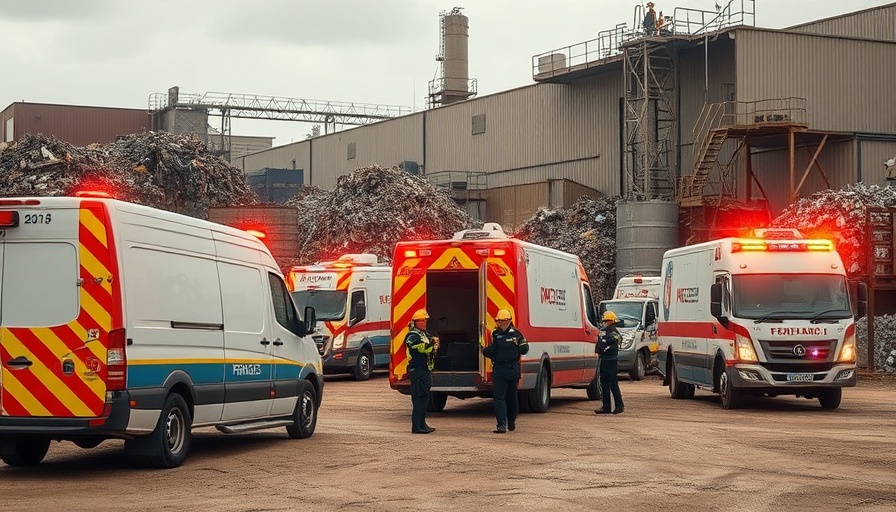
A Tragic Incident: Explosion at Pretoria Recycling Plant
On March 20, 2023, a devastating explosion at a recycling plant in Pretoria claimed the lives of two individuals and left three others injured. The incident occurred during operational hours, raising immediate concerns regarding safety regulations and emergency preparedness in South Africa's industrial sector.
Understanding the Context of Industrial Safety
South Africa has been grappling with numerous challenges related to industrial safety, largely due to the intersections of economic pressure, aging infrastructure, and sometimes lax enforcement of labor and safety laws. This explosion is a stark reminder of the potential dangers that loom in environments where waste material is processed, underscoring the need for thorough safety assessments and the implementation of stricter regulatory frameworks.
Community Response and Support Dynamics
The immediate response from local emergency services was crucial in addressing the aftermath of the explosion. First responders played a vital role in rescuing the injured and providing medical assistance. Local communities often rally together in such crises; however, assistance following tragedies like this must also involve long-term support strategies for victims’ families and affected workers. This sparks discussions on workplace safety standards and community health resilience amid economic recovery discussions.
Economic Implications: Recycling Industry Under Scrutiny
The recycling industry, touted as a key player in South Africa's economic landscape, faces intense scrutiny following this incident. With the economic recovery plan heavily reliant on sustainable practices, incidents like this challenge the narrative of a growing sector. Stakeholders must highlight the importance of adhering to safety protocols not only to protect workers but also to safeguard community trust in sustainable industries. The intersection of safety and economic growth forces policymakers to reassess their framework around investment in this sector.
Government Policies: A Call for Action
The tragic explosion raises pressing questions about government policies surrounding occupational safety, waste management, and emergency response protocols. If the government aims to ensure sustainable growth in industries crucial to environmental recovery, then fresh policy initiatives must not just focus on fostering growth in recycling but also amplifying accountability for safety standards. This incident could act as a catalyst for reevaluating existing laws and driving comprehensive reforms in risk management across South Africa.
Future Predictions: What Comes Next?
As public outcry for accountability persists, predictions suggest that there may be greater advocacy for government intervention and stringent regulations in industries deemed high-risk. This incident might prompt an overhaul in safety regulations that could potentially lead to better working conditions. Additionally, the increasing involvement of workers' unions in addressing industrial safety could reshape the landscape of labor rights and workplace safety norms.
Conclusion: Taking Action for Safer Workplaces
As South Africa confronts the aftermath of the recent explosion, there is a crucial opportunity not only to mourn the lives lost but also to spearhead extensive reforms that secure safer workplaces. Community voices must be amplified in calling for action against negligence in safety measures. It is essential to create an environment where both economic development and worker safety can coexist harmoniously. Professionals across sectors must advocate for change to safeguard against future tragedies and uphold the dignity of workers. As we reflect on this event, let us commit to pushing for a future where industrial safety is prioritized over economic expediency.
 Add Row
Add Row  Add
Add 




Write A Comment